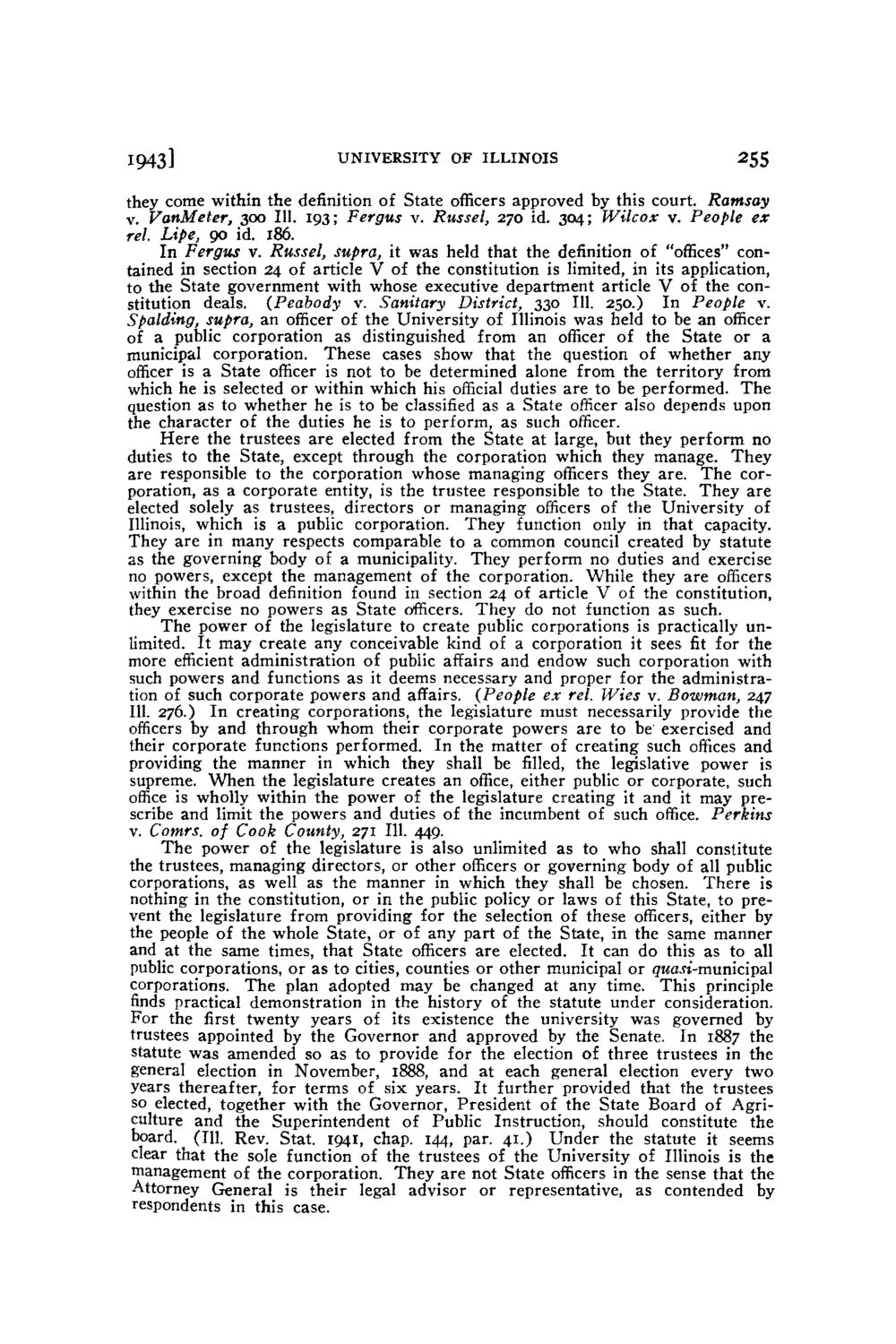| |
| |
Caption: Board of Trustees Minutes - 1944
This is a reduced-resolution page image for fast online browsing.

EXTRACTED TEXT FROM PAGE:
1943] UNIVERSITY OF ILLINOIS 255 they come within the definition of State officers approved by this court. Ramsay v. VattMeter, 300 111. 193; Fergus v. Russel, 270 id. 304; Wilcox v. People ex rel. Lipe, 90 id. 186. In Fergus v. Russel, supra, it was held that the definition of "offices" contained in section 24 of article V of the constitution is limited, in its application, to the State government with whose executive department article V of the constitution deals. (Peabody v. Sanitary District, 330 111. 250.) In People v. Spalding, supra, an officer of the University of Illinois was held to be an officer of a public corporation as distinguished from an officer of the State or a municipal corporation. These cases show that the question of whether any officer is a State officer is not to be determined alone from the territory from which he is selected or within which his official duties are to be performed. The question as to whether he is to be classified as a State officer also depends upon the character of the duties he is to perform, as such officer. Here the trustees are elected from the State at large, but they perform no duties to the State, except through the corporation which they manage. They are responsible to the corporation whose managing officers they are. T h e corporation, as a corporate entity, is the trustee responsible to the State. They are elected solely as trustees, directors or managing officers of the University of Illinois, which is a public corporation. They function only in that capacity. They are in many respects comparable to a common council created by statute as the governing body of a municipality. They perform no duties and exercise no powers, except the management of the corporation. While they are officers within the broad definition found in section 24 of article V of the constitution, they exercise no powers as State officers. They do not function as such. The power of the legislature to create public corporations is practically unlimited. It may create any conceivable kind of a corporation it sees fit for the more efficient administration of public affairs and endow such corporation with such powers and functions as it deems necessary and proper for the administration of such corporate powers and affairs. (People ex rel. Wies v. Bowman, 247 111. 276.) I n creating corporations, the legislature must necessarily provide the officers by and through whom their corporate powers are to be exercised and their corporate functions performed. In the matter of creating such offices and providing the manner in which they shall be filled, the legislative power is supreme. W h e n the legislature creates an office, either public or corporate, such office is wholly within the power of the legislature creating it and it may prescribe and limit the powers and duties of the incumbent of such office. Perkins v. Comrs. of Cook County, 271 111. 449. T h e power of the legislature is also unlimited as to who shall constitute the trustees, managing directors, or other officers or governing body of all public corporations, as well as the manner in which they shall be chosen. There is nothing in the constitution, or in the public policy or laws of this State, to prevent the legislature from providing for the selection of these officers, either by the people of the whole State, or of any part of the State, in the same manner and at the same times, that State officers are elected. It can do this as to all public corporations, or as to cities, counties or other municipal or g«a.«'-municipal corporations. The plan adopted may be changed at any time. This principle finds practical demonstration in the history of the statute under consideration. For the first twenty years of its existence the university was governed by trustees appointed by the Governor and approved by the Senate. In 1887 the statute was amended so as to provide for the election of three trustees in the general election in November, 1888, and at each general election every two years thereafter, for terms of six years. It further provided that the trustees so elected, together with the Governor, President of the State Board of Agriculture and the Superintendent of Public Instruction, should constitute the board. (111. Rev. Stat. 1041, chap. 144, par. 41.) Under the statute it seems clear that the sole function of the trustees of the University of Illinois is the management of the corporation. They are not State officers in the sense that the Attorney General is their legal advisor or representative, as contended by respondents in this case.
| |